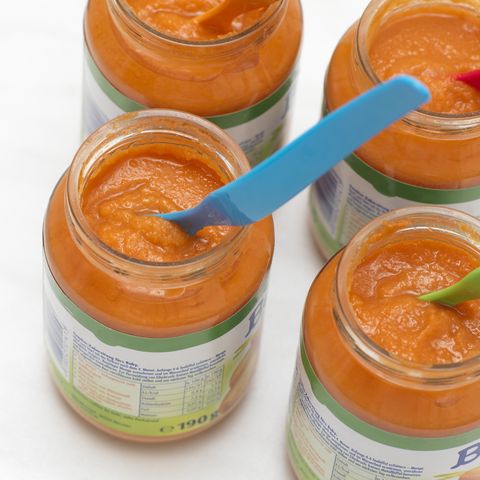Does Baby Food Contain Heavy Metals? Experts Weigh In on Toxic Baby Food Report

- A recently released congressional report that found heavy metals in popular baby foods is causing concern for parents nationwide.
- Major infant food manufacturers like Gerber and Beech-Nut are among the brands that “permit dangerously high levels of toxic heavy metals” in their food, according to the report.
- However, the American Academy of Pediatrics (AAP) says that “low levels of heavy metals found in baby foods likely are a relatively small part of a child’s overall heavy metal exposure risk.”
- Doctors advise not overreacting to the new report, but instead taking sober, science-backed actions to limit heavy metals and arsenic in your baby’s diet.
On February 4, a new congressional report came out claiming that a number of top baby food brands are “tainted with dangerous levels of inorganic arsenic, lead, cadmium and mercury.”
Garnering widespread media attention, the report detailed that a subcommittee of congressional investigators requested internal documents and test results analyzing levels of heavy metals found in products from seven of the country’s biggest infant food manufacturers, including Nurture (HappyBABY), Beech-Nut, Hain (Earth’s Best Organic) and Gerber. The subcommittee also noted they are “greatly concerned” that Walmart, Sprout Foods and Campbell Soup Company (Plum Organics) did not provide reports or samples for review, despite requests.
In the report, congressional investigators claimed that the research showed these top baby food brands have “internal company standards [that] permit dangerously high levels of toxic heavy metals, and documents revealed that the manufacturers have often sold foods that exceeded those levels.”
In response to the report, almost all of the brands cited have refuted it in some form or another. Hain released a statement saying, “We are disappointed that the subcommittee report examined outdated data and does not reflect our current practices,” also noting the brand met with the U.S. Food and Drug Administration (FDA) last year to discuss how to better refine their standards and practices; Gerber noted they “meet or exceed all existing government requirements,” and have “established our own high standards based on the latest food safety guidance.” As for Campbell Soup Company, the brand said in a statement that they responded quickly to the subcommittee’s questions and “never refused anything requested of us,” while Walmart says they did submit information to the subcommittee but never received any subsequent inquiries, according to Reuters.
Of course, the report’s findings sound alarming to the millions of parents who feed these products to their children. (In 2019 alone, the national baby food market stood at over $6 billion and is projected to grow to $6.7 billion by 2025.) As a concerned mom or dad, what is the next best step for you and your baby? Is homemade baby food the only way to go?
Here’s everything you need to know about heavy metals in baby food and how to minimize your child’s exposure:
First, what exactly are “heavy metals”?
Heavy metals are naturally occurring elements that are found throughout the earth’s crust. Air, soil and water all contain these metals; they are in the ground we walk on and in the water we drink. Five specific elements — arsenic, cadmium, chromium, lead and mercury — have high degrees of toxicity and rank among the priority metals that are of great public health concern. At high levels, they can be harmful and toxic to the human body. “Heavy metal exposure in infants has the potential to damage the developing brain leading to neuro-developmental effects including lower IQ, cognitive impairments and behavior problems,” says Robert Coles, MD, Pediatrician at UC San Diego Health.
But some heavy metals, like iron and zinc, are essential for our bodies to function. Metals such as copper, iron, magnesium, selenium and zinc are considered essential nutrients; inadequate intake of these micronutrients can result in deficiency complications and lead to disease. “Zinc is an essential mineral involved in immune function, growth, development, wound healing and cell production. Zinc deficiency can lead to stunted growth in children and adolescents,” says Megan Meyer, PhD, Director of Science Communications at the International Food Information Council. She also points out that iron plays an important role in moving oxygen around in the body, a reason why iron is intentionally added to foods like breakfast cereals and infant formulas for enhanced nutrition.
So, how do toxic heavy metals get into baby food?
The recent congressional report may have parents assuming that heavy metals are being added to store-bought baby food brands in toxic amounts, but that’s not necessarily the case. When it comes to food production, levels of heavy metals can vary based on several factors, including growing conditions and agricultural processes. “Heavy metals such as lead, arsenic, cadmium and mercury occur naturally in soil, water and air,” Dr. Meyer says. “They enter the food supply when plants grow. They are naturally occurring, and are not added to food.”
This content is imported from Instagram. You may be able to find the same content in another format, or you may be able to find more information, at their web site.
Although these elements are naturally present in the soil and therefore the food we eat, the report points out that the FDA currently has no set levels for the maximum amount of toxic heavy metals permitted in baby food. While the FDA has issued guidance to finalize the 2016 draft guidance for inorganic arsenic in infant rice cereals, regulations and testing around heavy metals in baby food has yet to be fully established. “I look forward to FDA’s careful regulation of these toxic heavy metals in baby foods, followed by strict compliance requirements and mandatory consumer labels,” read a statement from Subcommittee Chairman Raja Krishnamoorthi.
Dr. Coles says that recommendations in the congressional report are an excellent place to start, including mandatory testing for heavy metals by baby food manufacturers and establishing FDA standards for maximum levels of toxic heavy metals permitted in baby foods.
Should I be worried about heavy metals in baby food?
While the new congressional report does illuminate valid concerns about heavy metals in our food supply, the American Academy of Pediatrics (AAP) states that the “low levels of heavy metals found in baby foods likely are a relatively small part of a child’s overall heavy metal exposure risk.”
“Concerned parents should not panic or overreact to the report,” Dr. Coles says. “This issue has been discussed in the past. If parents are providing a varied diet for their children and following the recommendations of the AAP, the risks are low and there is no need to be overly concerned.”
Dr. Coles points out that there are many other environmental sources of toxic heavy metals that parents should be more concerned about. For example, the CDC states that the primary sources of lead, a common heavy metal, are homes built before 1978, which are more likely to contain lead paint, and certain water pipes, toys, jewelry and imported candies, which all have the potential to pose a greater risk.
“In order to reduce the risk that children will be exposed to heavy metals from any and all sources, the AAP recommends that parents address lead hazards in the home, check water for heavy metals, avoid smoking or vaping which may exposure children to cadmium and lead, breastfeed if possible, make healthy fish choices as some can be high in methylmercury, serve a variety of foods, and switch up grains — particularly avoiding rice,” says Dr. Coles.
As a new mom, Dr. Meyer adds that the issue strikes close to home for her. “I think what’s most important for people to realize is that baby food is not a significant source of heavy metal exposure,” she says. “Instead, I hope that parents will prioritize feeding their children a diverse diet that includes a variety of fruits and veggies, whole grains, healthy fats and protein.”
Is organic or homemade baby food a better bet than conventional?
Parents might assume that purchasing organic baby food might avoid the issue altogether, but Dr. Meyer says that this may not be the case. “According to the AAP, since heavy metals are found in the soil, both organic and conventional baby food contain similar levels of heavy metals,” she explains.
As for making baby food at home, the AAP states that this can provide a bit more control since you’re choosing the ingredients and might also be avoiding potential contaminants from processing or packaging. But again, since produce comes from the earth, trace levels of heavy metals may still be present.
How to limit heavy metals in your baby’s diet
The AAP shares that the most important thing for parents to do is to offer a variety of foods to your baby, since completely avoiding heavy metals in any food is nearly impossible since they are naturally present in the earth. But there are a few evidence-based actions you can take to limit heavy metals in your baby’s diet:
- Vary the types of foods being offered. The best — and most practical — piece of advice for parents is to vary the types of food being offered to your baby, in order to provide a variety of nutrients and decrease the amount of arsenic in your child’s diet.
- Limit fruit juices. The AAP has long recommended limiting intake of all sweet beverages, including juice, to reduce the risk of obesity and dental carries in children. Not only does fruit juice have a high sugar content and no fiber, but a 2019 report found levels of arsenic and lead in many popular fruit juice brands. Grape juice and juice blends had the highest average heavy metal levels as per this report. Limit fruit juices to no more than 4 oz per day and avoid them until at least 1 year of age. Instead, try breastmilk or infant formula for babies, and water or milk for older children.
- Limit rice and rice-based products. Arsenic, one of the heavy metals of concern, is naturally present in rice. Several baby food items and snacks, like rice cereal, puffs and many teething crackers, contain rice as the leading ingredient. Try to limit or avoid these rice-based products in your baby’s diet, and offer infant cereals like oat, barley or multigrain options instead.
- Try parboiling rice. That said, rice is an important culinary component of many cultures. If it’s a staple in your home, a cooking technique known as parboiling with absorption (PBA) method may remove a significant portion of arsenic from both brown and white rice. This method essentially involves pre-boiling the rice before draining and refreshing the water.
- Include a variety of grains in your baby’s diet. Buckwheat, millet, amaranth, farro, barley, quinoa and bulgar are great options to incorporate into your baby’s diet and eating routine.
This content is imported from {embed-name}. You may be able to find the same content in another format, or you may be able to find more information, at their web site.
This content is created and maintained by a third party, and imported onto this page to help users provide their email addresses. You may be able to find more information about this and similar content at piano.io
Source link






